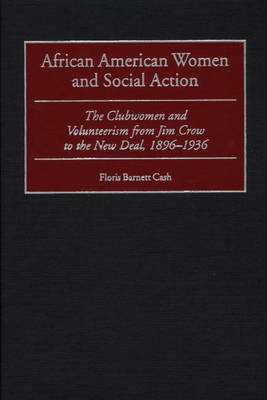
African American Women and Social Action
The Clubwomen and Volunteerism from Jim Crow to the New Deal, 1896-1936
Seiten
2001
Praeger Publishers Inc (Verlag)
978-0-313-31563-3 (ISBN)
Praeger Publishers Inc (Verlag)
978-0-313-31563-3 (ISBN)
An examination of the volunteer efforts of black clubwomen in the National Association of Colored Women from 1896 to 1936. It explores how their work influenced the impact and direction of social services in black communities in the USA, especially during the Progressive Era.
Black women have a long history of collective struggle to create welfare organizations, schools, orphanages, and health centers for African Americans. Their clubs evolved for many reasons, including self-education, community improvement, and to raise the standards of black women. Many of these women, educated beyond their race and gender and with a commitment to their communities, turned to volunteer work. This book examines the volunteer efforts of black clubwomen in the National Association of Colored Women from 1896 to 1936, and explores how their work influenced the impact and direction of social services in black communities, especially during the Progressive era. The innovative role black clubwomen played at this time aided the African American community in both social change and community survival.
A variety of factors motivated black women to organize club associations, including the urgent social needs of poor African Americans who were excluded from all public relief, an increasing number of educated middle-class black women, and the growth of urban black communities due to migration from the South. The pioneer clubwomen of this time period established successful social service programs and agencies, and laid the foundation for opportunities and assistance in education, political and religious leadership, and social service within the African American community. Social services established by the clubwomen, such as travelers' aid, job training and placement, settlement houses, child and family welfare services, and preventive health care services, provided the foundation for the Urban League and the emergence of professional black social workers. The first black school of social work, the Atlanta School of Social Work, was a direct outgrowth of the activities of the Neighborhood Union Settlement.
Black women have a long history of collective struggle to create welfare organizations, schools, orphanages, and health centers for African Americans. Their clubs evolved for many reasons, including self-education, community improvement, and to raise the standards of black women. Many of these women, educated beyond their race and gender and with a commitment to their communities, turned to volunteer work. This book examines the volunteer efforts of black clubwomen in the National Association of Colored Women from 1896 to 1936, and explores how their work influenced the impact and direction of social services in black communities, especially during the Progressive era. The innovative role black clubwomen played at this time aided the African American community in both social change and community survival.
A variety of factors motivated black women to organize club associations, including the urgent social needs of poor African Americans who were excluded from all public relief, an increasing number of educated middle-class black women, and the growth of urban black communities due to migration from the South. The pioneer clubwomen of this time period established successful social service programs and agencies, and laid the foundation for opportunities and assistance in education, political and religious leadership, and social service within the African American community. Social services established by the clubwomen, such as travelers' aid, job training and placement, settlement houses, child and family welfare services, and preventive health care services, provided the foundation for the Urban League and the emergence of professional black social workers. The first black school of social work, the Atlanta School of Social Work, was a direct outgrowth of the activities of the Neighborhood Union Settlement.
FLORIS BARNETT CASH is an Assistant Professor of Africana Studies and History at the State University of New York, Stony Brook. She teaches in the Department of Africana Studies and has courses affiliated with Women's Studies.
Preface
Introduction
Black Women and Social Action: A Historical Perspective
African American Women Organize to Ameliorate Social Conditions
Club Women and Social Housekeeping in the South Social Settlements and School Settlements
Black Bourgeoisie in the Slums or Helping Women: Paradigms of Black Settlement Houses in the North and Midwest
The National Urban League and the Professionalization of Black Social Workers
A New Image: From the New Negro Woman to the New Deal
Epilogue
Manuscript Collections
| Erscheint lt. Verlag | 30.4.2001 |
|---|---|
| Reihe/Serie | Contributions in Women's Studies |
| Sprache | englisch |
| Maße | 156 x 235 mm |
| Gewicht | 482 g |
| Themenwelt | Geschichte ► Allgemeine Geschichte ► Neuzeit (bis 1918) |
| Geisteswissenschaften ► Geschichte ► Regional- / Ländergeschichte | |
| Geschichte ► Teilgebiete der Geschichte ► Kulturgeschichte | |
| Geschichte ► Teilgebiete der Geschichte ► Sozialgeschichte | |
| Sozialwissenschaften ► Pädagogik ► Sozialpädagogik | |
| Sozialwissenschaften ► Soziologie ► Gender Studies | |
| ISBN-10 | 0-313-31563-9 / 0313315639 |
| ISBN-13 | 978-0-313-31563-3 / 9780313315633 |
| Zustand | Neuware |
| Haben Sie eine Frage zum Produkt? |
Mehr entdecken
aus dem Bereich
aus dem Bereich
Europa 1848/49 und der Kampf für eine neue Welt
Buch | Hardcover (2023)
DVA (Verlag)
CHF 67,20
Giordano Bruno - ein ketzerisches Leben
Buch | Hardcover (2024)
C.H.Beck (Verlag)
CHF 41,85


